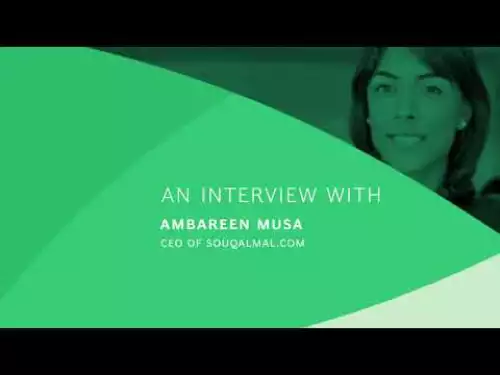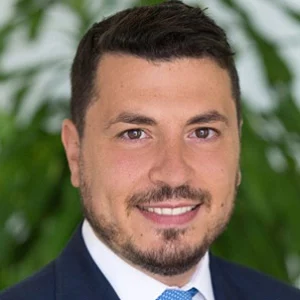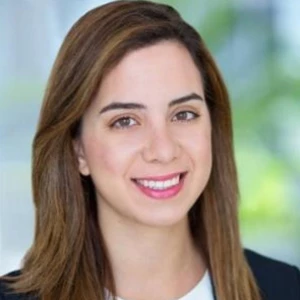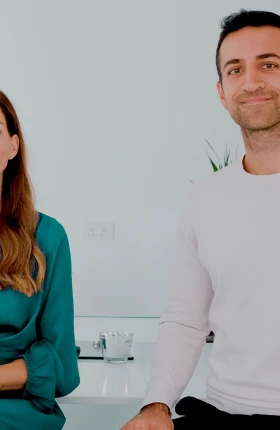Souqalmal.com is a leading financial comparison platform in the Middle East. Founded in 2012, the company is based on a concept of comparative banking products and launched well before comparison engines existed. Consumers visit souqalmal.com to purchase insurance—travel, car, bike, fleet, yacht, health, home—and within minutes have a policy in hand. The company offers bank accounts, personal loans and credit cards, and its newest product is insurance for small- and medium-sized enterprises (SMEs). Forbes ranked Souqalmal.com #2 among Fintech startups in the Middle East and the firm has won multiple awards, including Gulf Capital’s SME Disruptor of the Year.
Under Ambareen Musa’s leadership, Souqalmal.com is recognized as a thought leader and customer advocate in the financial services industry. In this interview, we talk about the company’s long-term vision, the impact of COVID on that vision, and discuss several forward-looking market trends.

Innovation Talks with BCG Middle East
Innovation Talks focuses on consumer and industry trends, highlighting the ways in which digital and innovative companies tackle their most ominous challenges, and what they have to offer their local customers.
Our featured guests discuss how digital is enabling new business models and innovations that do not yet exist in our region—but will soon—and offer advice to young entrepreneurs who want to learn more about setting-up and growing startups in Middle East.
The impact of COVID on businesses is an important part of the debate as it has changed consumer trends and introduced new ways of working that are re-shaping their culture.
In our first round of Innovation Talks, we interview three leaders. Tarek Kabrit is co-founder and CEO of Seez, an innovative app to search, buy, and deliver cars throughout the region—UAE, Saudi Arabia, Kuwait, Pakistan, and South Africa. Gheed El Makkaoui, is the country GM of Careem, a one-stop hassle-free app designed to meet the needs of everyday life—from rides and ordering food to shopping and paying. Finally, Ambareen Musa, CEO of Sougalmal, joins Innovation Talks to discuss her financial products comparison site—offering an end-to-end process to apply for loans, credit cards, bank accounts, and insurance. The company was named #2 startup of the year by Forbes ME.
Thank you for joining us. We hope you find our Innovation Talks to be substantive, well-informed, and thoroughly enjoyable.
What is your long-term vision for Souqalmal.com? How do you see the business growing over the next 5 to 10 years?
Our vision is to grow regionally and become the one-stop shop for our clients’ personal financial needs. It will take time because of regulations and priorities, not to mention the pandemic, but I'm looking forward to the next 12 months as a big year for our company.
You were about to introduce some new products and services when the pandemic hit. How did you handle the unexpected disruption?
Wherever there are risks, volatility, and uncertainty, there are also opportunities. Our job is to find them.
COVID has been a challenge, no question about it. But wherever there are risks, volatility, and uncertainty, there are also opportunities. Our job is to find them. The first thing we looked at was our cashflow position over the coming 12 months. As banks were crashing, acquisitions were out of the question, so we needed to find other ways to grow the business. We decided to view COVID as an opportunity to innovate, to give back to the community, and to grow our business. For example, as some of our customers were losing their jobs it was difficult for them to pay US$1,000 upfront for a one-year car insurance policy. So, we launched the region’s first ever monthly car insurance payments. We also introduced our end-to-end application process for banks and simplified the application process for credit cards and personal loans. Today, our customers apply on souqalmal.com where we look at their eligibility and offer workable options—the latest options, not the ones from two to three weeks earlier.
How do you see the consumer sentiment going forward? What are the changing behaviors of Middle East consumers?
My initial pitch to investors was to give us five to six years to get our Middle East consumers’ online behavior comparable to U.S. and European consumers. But COVID hit and our timetable was suddenly shortened—to three months—as online shopping and digital products took center stage. Shortly after COVID hit we took a survey, finding that 65% of respondents had tried an online channel for the first time to get their finances in order, and 45% plan to continue using online channels post-COVID. Consumers, it seemed, would not go back to offline behaviors.
Where do you see financial platforms moving in the next three to five years?
Anything can happen, depending on how and when the economy comes back. But one thing is clear: Fintech and Insuretech have a great opportunity to power position. Why? Because they talk to consumers, own consumer information, and have built consumer trust. We expect the banks to turn into back office players that handle underwriting, administrative work, and actual risks. As most FinTech companies are agile and able to respond quickly to consumer behaviors – they have a leverage to predict industry trends, and customize their offerings based on those trends. We expect smaller FinTech and digital companies to analyze data, develop new products, and speed them to market.
Where does innovation stand in the Middle East financial services industry?
Financial services are still among the most regulated industries in the region. Innovation “sandboxes” are being built in a variety of jurisdictions, but these markets are quite small. So, scaling up has meant building a new company in each jurisdiction, each one with different laws, regulations, stakeholders, and consumer behaviors. I hope that in the long-term, the Middle East would have one region-wide jurisdiction that is big enough to deliver returns on R&D. From a regulatory perspective, having one passport for the whole region would be ideal.
Your team and their talents are your most important assets. How do you attract and retain top talent?
Acquiring top talent has been a challenge, second only to regulations. We launched Souqalmal.com eight years ago when the region’s ecosystem of digital and tech startups was young. We did not have the big players—the Googles and Facebooks—so attracting people to startups was not easy. However, as we grew our brand it became easier to recruit top talent. And with the exits of Careem and Souq.com, some very talented candidates have been drawn to the start-up world. Today, it is easier to convince top talent to join us for the vision and not just the cash.
Interestingly, the new reality created by COVID has changed our culture in a good way. For example, the level of productivity in the past three months has been incredible. It's not only about acquiring the best people, but also retaining them and their passion for our vision.
What advice do you have for entrepreneurs planning to start their own businesses?
First, launching a business is a once-in-a-lifetime experience and I encourage anyone who wants to build a business to go for it. However, it’s important to know why you are starting your business as it’s a 7- to 10-year path that requires a 24/7 commitment and hard work. I was 21 when I started my first business in Australia, and my dad who is an entrepreneur warned me saying “You do understand that you will not be around for holidays, and you will wake up in the middle of the night with a million worries,” he said. “You will need perseverance, tenacity, and, most importantly, to know when to let go.”
When you go in front of investors, especially in the early stages, what they look for is less about the business and more about you as a founder. Do you have the passion to succeed? Do you have the grit to fail and then pick yourself up and start over? These are traits that all investors look for.
Finally, never get emotionally attached. It’s important to know when you need to pivot and change strategy, and when to cut costs. If emotions get between you and your business decisions, you will fail.







